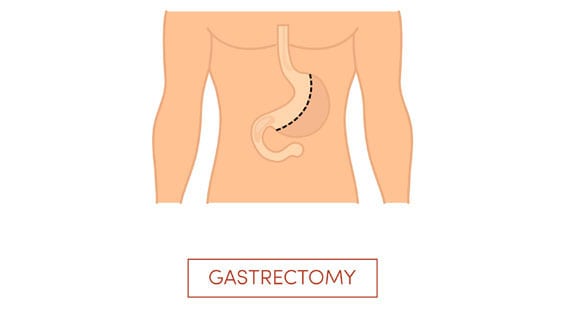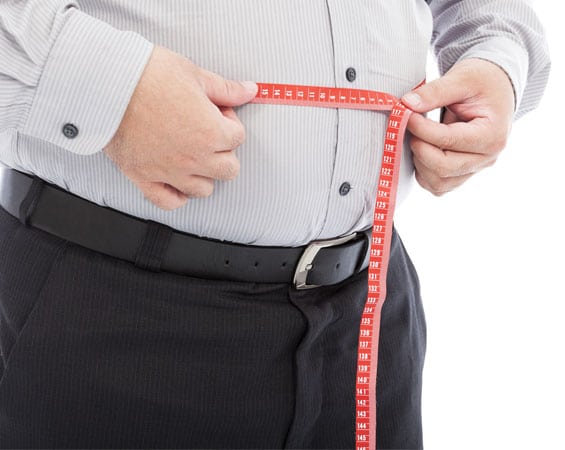Sleeve Gastrectomy

Maintain a healthy weight with the Sleeve Gastrectomy.
There are many factors to consider when deciding among bariatric surgeries.
- How invasive is the procedure?
- How much weight would you like to lose?
- What is the recovery like?
- How is the operation performed?
If you are asking yourself these questions, you’ve come to the right place. Read on for a careful consideration of the sleeve gastrectomy procedure.
How Does the Sleeve Gastrectomy Work?
There are two main types of bariatric procedures, restrictive and malabsorptive. Malabsorptive procedures work by removing portions of the intestine responsible for the absorption of kilocalories. Restrictive procedures work by actually reducing the size and capacity of the stomach to physically limit food intake. The sleeve gastrectomy is this second type of restrictive procedure.
During a sleeve gastrectomy, a bariatric surgeon removes a portion of the stomach and fashions the remaining stomach into a tube-like shape. The resulting stomach holds less food than the original stomach. Gastric sleeve patients experience less hunger and feel full more quickly than they did prior to surgery.


Sleeve gastrectomy procedures have another advantage for patients. Ghrelin is a hormone synthesized by released from the stomach. When the stomach is empty, receptors signal the synthesis of ghrelin. Once it reaches the brain, ghrelin cues the body to feel hungry. By reducing the size of the stomach, sleeve gastrectomy reduces the amount of ghrelin released, reducing hunger by way of this hormonal mechanism.
What Are the Benefits of Sleeve Gastrectomy?
Sleeve gastrectomy comes with many benefits to overweight and obese patients. Most obviously, sleeve gastrectomy results in significant weight loss by reducing food intake. Studies have found that patients who have undergone sleeve gastrectomy lose more weight than with many other weight loss procedures. For example, sleeve gastrectomy has been shown to lead to as much, and sometimes more, weight loss than the more invasive gastric bypass and duodenal switch procedures.
The sleeve gastrectomy comes with other advantages as well. Because it is a restrictive, rather than malabsorptive, procedure, sleeve gastrectomy does not lead to dumping syndrome. A complication of surgical procedures performed on the bowel, dumping syndrome consists of increased motility and diarrhea due to malabsorption of fat in the gut. The symptoms are more than just uncomfortable. They can lead to deficiencies of fat-soluble vitamins and important minerals.
Operating time is also shorter for sleeve gastrectomy than other bariatric procedures. This leads to fewer complications and quick recovery time.
Is Sleeve Gastrectomy Right for You?
Only a bariatric doctor can determine which type of bariatric surgery is right for you. You can facilitate that conversation by familiarizing yourself with the different procedures and patient criteria.
One factor to consider is the amount of weight you have to lose. sleeve gastrectomy patients can expect to lose up to 60% of their excess body weight in the 18 months following the procedure. In comparison, gastric bypass recipients can expect to shed 70% of excess body weight, while lap band outcomes hover at roughly 50% excess weight loss.
Maintenance required varies by bariatric procedure as well. The gastric band typically requires periodic adjustments to achieve your desired results. It also requires the width of the band is adjusted by injecting it with fluid using a needle. However, with sleeve gastrectomy, the stomach maintains its shape without the presence of a foreign body in sleeve gastrectomy patients.
What Can You Expect During Recovery?
All bariatric procedures necessitate adequate recovery, followed by permanent lifestyle change. Pain, to varying degrees depending on the patient, can be expected during the recovery period. The first two days or so following the procedure will be spent in the surgical center, where pain medication will be administered in a controlled setting.
You will transition through a few stages of diet consistency following the procedure. Initially, recovery demands a diet of clear liquids only. The patient will be allowed to advance to other diet consistencies as time passes, at the surgeon and registered dietitian’s discretion.
Only light physical activity can be performed in the initial recovery period. Heavy lifting and other strenuous activity are prohibited. This is usually not a problem, as patients can become fatigued from the healing process and reduced calorie intake in the first few weeks. Your surgeon, therapist, and dietitian will offer detailed discharge instructions to help you with your recovery.
Putting It All Together
In summary, the sleeve gastrectomy is an excellent choice for patients considering bariatric surgery. It is safe, effective, and has shown long term success in clinical trials. Visit our surgical center today for more information on, and to discover if you’re a candidate for, sleeve gastrectomy or other weight loss procedures.

